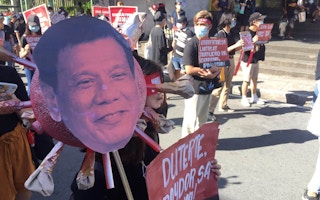Philippine President Rodrigo Duterte’s state of the nation address has been criticised by green groups for excluding renewable energy development to aid the country’s recovery from the coronavirus crisis.
Duterte on Monday (27 July) addressed a nation grappling with an economic slowdown and a health crisis. The Philippines’ total number of Covid-19 cases rose to more than 82,000 as of 28 July.
The president’s fifth state of the nation address was expected to outline a post-pandemic recovery, as well as report on the government’s Covid-19 response.
Power for People Coalition, a network of civil society organisations, communities and cooperatives that rally against pollutive fuels, expressed its “disappointment” that Duterte did not reaffirm his directive to the department of energy to reduce the country’s reliance on coal—a policy pronouncement he made in last year’s address.
“Renewable energy empowers consumers because it can reduce their dependence on the monopolistic grid, help protect the environment, and cost less,” said Gerry Arances, convenor of Power for People Coalition.
“In recognising the power of renewable energy to deliver power where coal-based power can’t, we cannot understand why the President cannot make the logical conclusion that renewable energy can do more than coal to benefit the country’s recovery from Covid-19.”
“
We cannot understand why the President cannot make the logical conclusion that renewable energy can do more than coal to benefit the country’s recovery from Covid-19.
Gerry Arances, convenor, Power for People Coalition
The country already has US$21 billion worth of coal plant assets in the pipeline that risk being stranded, and pays more than US$200 million per year in diesel subsidies, he added.
Arances also noted how the power bill shock from main distribution utility Manila Electric Company (Meralco) during the lockdown was left out from Duterte’s speech, despite the surge in electricity being a “major blow” for consumers.
“Power consumers all over the country are also certainly dissatisfied that, while the President did warn private electricity providers to serve end-users better, no satisfactory resolution was provided. There was no mention of Meralco’s bill shock, (or) immediate power relief for consumers as they struggle with the economic dislocation caused by the pandemic,” he said.
Lea Guerrero, country director of environmental watchdog Greenpeace, said it was dismayed by the lack of a “coherent policy agenda” for the environment, including the absence of a coal phase-out.
“If the government pushes through with coal now, we’ll be locked into 25-year contracts for a power plant that produces more expensive electricity than renewable energy. At a time when the country needs to be thinking about long-term economic solutions, coal really isn’t part of the solution economically, aside from how it’s already bad for health and the climate,” Guerrero told Eco-Business.
Boracay rehabilitation showcases the government’s ‘narrow environmental agenda’
In his speech, Duterte said protecting the environment was a “non-negotiable priority”, citing the rehabilitation of famed tourist island Boracay.
He called on lawmakers to put up a body that would ensure that the effects of the months-long rehabilitation of the island are sustained.
Boracay was closed for six months in 2018 for a clean-up, after Duterte called the tourist destination a “cesspool.”
But Greenpeace’s Guerrero said the island’s rehabilitation only reflected the administration’s “narrow environmental agenda”.
“
Boracay may have been rehabilitated in 2018, but are the effects of the rehabilitation lasting? A comprehensive plan for it could have considered how the island can be more sustainable moving forward.
Lea Guerrero, country director, Greenpeace Philippines
“There have not been any strong policy interventions that address the root of problems for polluted tourist sites like Boracay. It could benefit from a comprehensive zero waste programme, including a no-single use plastics policy, that can be replicated in other island municipalities where the scourge of plastic waste is most evident,” said Guerrero.
“Without preventive policy measures in place, after the clean up of Boracay, waste started piling up again.”
Guerrero said another policy shift in Boracay could have been the adoption of renewable energy. Small islands like Boracay get much of their electricity from expensive imported diesel or transmission lines from bigger island groups like nearby Panay Island, she added.
“Boracay may have been rehabilitated in 2018, but are the effects of the rehabilitation lasting? A comprehensive plan for it could have considered how the island can be more sustainable moving forward,” she said.
Environmental group Kalikasan People’s Network for the Environment called the government’s recovery efforts for Boracay a “greenwash”, noting how the clean-up had further disrupted the island’s ecology. In a statement, the group cited how there were no longer any sightings of the island’s endangered and endemic fruit bat population called Golden Crowned Flying Fox and Large Flying Fox.
“Boracay’s flying foxes are important bioindicators of habitat disturbance and pollution. This means that the rehabilitation programme has failed to arrest the encroachment of tourism infrastructure into the island’s forests and wetlands,” the statement noted.





















